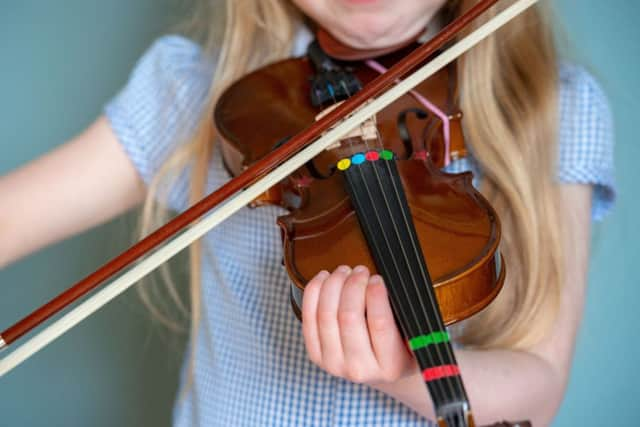Union launches fight to save school music tuition


Larry Flanagan, general secretary of the Educational Institute of Scotland, (EIS) says “catastrophic” budget cuts to local authorities have resulted in a “postcode lottery” of who is entitled to lessons with some music teachers saying annual charge of over £500 are being discussed.
More than two-thirds of Scotland’s councils charge for music tuition, with fees rising.
Advertisement
Hide AdClackmannanshire Council voted to double music tuition costs. With some exceptions, parents will now pay £524 annually.
Delegates at the EIS annual general meeting in Dundee next week, will discuss a motion from its Midlothian local association, calling for instrumental music provision to be protected in schools.
The EIS has previously expressed concern about a dramatic fall in the number of music teachers – from 1,100 to 640 over the past decade.
Larry Flanagan, EIS general secretary, said, many parents were unable to afford the tuition fees and that a Scottish Government school music initiative offering 12-hour “taster sessions” was detrimental to talented pupils from poorer families who were subsequently left unable to afford tuition.
“Our position is that the cuts that have been imposed on these services during a period of austerity budgeting, and the increase in charges levied to families for music tuition, have contributed to a significant erosion of music in schools and place them at risk of extinction.
“EIS members who teach instrumental music are now reporting catastrophic cuts and outrageous charges; we are hearing of annual charges of up to £524 per pupil being mooted; and music services losing up to ten full time equivalent staff in the most recent budget round.”
Advertisement
Hide AdMr Flanagan added: “The Scottish Government is quick to cite its support for the Youth Music Initiative. This initiative, while positive, it is no substitute for properly resourced local authority music services.
“It generally offers twelve hours of learning on one instrument, serving as a taster for music education. It is a travesty that children who show interest and ability during these taster sessions are being denied access to fully-funded instrumental music services in the longer term, or excluded by unaffordable charges.”
Advertisement
Hide AdIain Gray, MSP, Scottish Labour’s education spokesman, said: “Music tuition is a key part of learning and has been proven to help children learn at school.
“Access to music tuition for pupils across the country is therefore essential - but the reality is SNP cuts to council budgets, totalling more than £1.5billion since 2011, are making this impossible across many local authority areas.
“Scottish Labour supports EIS’ call to protect music tuition across the country - but the SNP government must provide the additional funding to pay for it.”
Tavish Scott, Scottish Liberal Democrat education spokesperson said: “Music and the arts should be integral to Scotland’s education system. The ever tightening squeeze on local authority finances is pushing children away from discovering or pursuing these talents and that cannot be right.
“Every child should have the opportunity to take up an instrument or a paint brush and the Scottish Government needs to ensure that music and art is available in every school.”
A Scottish Government spokeswoman said: “Music tuition is of enormous benefit to young people and the Scottish Government is actively providing leadership to encourage participation in music.
Advertisement
Hide Ad“Local authorities are directly responsible for spending on music tuition in schools. Overall funding to councils is increasing in real terms, despite continued UK Government cuts to Scotland’s resource budget.
“While respecting the autonomy of local councils, Scottish Ministers have committed to working in collaboration with partners to find solutions that help ensure instrumental music remains accessible to all.”